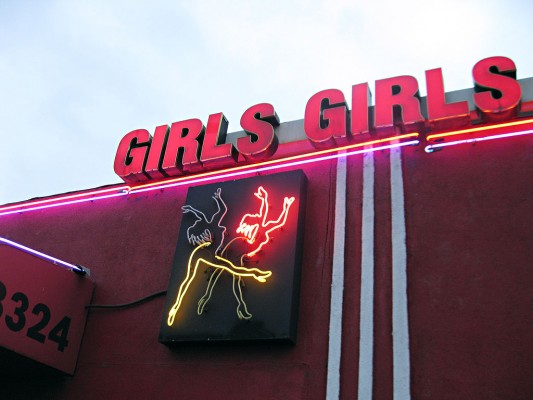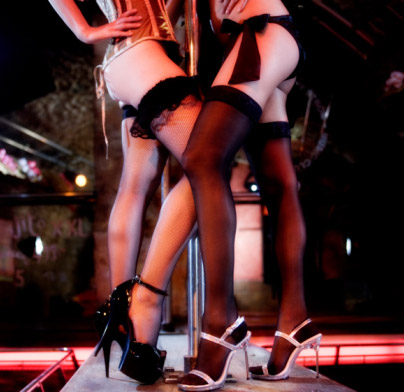The almighty dollars wait to be scooped up from the floors of Dreams… Jaguars, Tequila Sunrise or any strip club The bills are usually wet from the sweaty hands of the men, eager to touch the women. Up on the poles, the women hang on a fine line that moves from humility to humiliation, from objectification to empowerment.
In the instant it takes to kneel down and pick up the bill, an array of emotions and thoughts web through the stripper’s mind. Having once been employed by local strip clubs, I know that feeling and I recall the stigmas that are born from such a life.
I decided to dive back into the world of strip clubs for a class project and look again into the tangled universe of a stripper’s thoughts.
Although I personally couldn’t handle that agitated and demanding environment for long, I continued my communication with some of the women who work there still, and I maintain friendships with several of them. For my project, I decided to explore the pressing question that drove me to quit: is a strip clubs a place where women become objescts or is it a place of empowerment for women?

Photo by Rick Hall via Wikimedia Commons
While it remains true that women in general earn only an average of 70 cents for each dollar a man earns, strip clubs are places where men (for the most part), go and spend stacks of dollars on women. Strip clubs provide a lucrative form of employment for many women around the world.
In my attempt to focus my thoughts, I interviewed several women who currently dance at local clubs. Each of them had unique outlooks on their professions. While one woman was completely aloof about her job, and felt no association with the stigmas society places on her and her employment, another woman felt conflicted with the occupation, and was much more contemplative while at work. She tells me, “I can never be at ease when I’m at work. Other girls do it so effortlessly.”
In the eyes of most, it is deemed a shameful occupation, even considered taboo. Others see it as a job, no different from any other. Some see it as the perfect job, because the women get to choose their own hours and generally earn quite a large amount of money each night.
In my case, I was distracted, observing the many faces and dissecting their expressions. Some of the men had eerie looks in their eyes, and some of the stripper’s eyes oozed with humiliation. Others seemed enthusiastic, calm, cool, and in control– both men and the women.
At some point it overwhelmed me; I couldn’t properly function or even make my money. I also grew preoccupied thinking about how these men would spend exaggerated amounts of money to see women dance and tease away. I felt that it could be better invested in a billion different ways.
Then, I began to question why such a thing even exists while we have hunger, homelessness, and plenty of other ailments to overcome as a society. We already have sex everywhere. Corporate america tells us ‘sex sells’, but what is it that is really being sold in strip clubs? Objectification or empowerment, and at what cost?
Women’s rights activists have been fighting for centuries so that we can exercise our right to do what we want with our bodies and not be recognized only as sexual objects. Strippers are ironically doing both— what they want with their bodies, while being recognized solely as sexual objects.
But! they are being paid for it. Does this make it right, worse, or does it even make a significant difference?
Are these women really only taking fair advantage of what is at their anatomical disposal, or are they furthering the objectification of women, which continues to be perpetuated through other aspects of our reality anyway?
Ultimately, these questions helped me piece together my own perspective on the subject and turned me to new direction academically. As a result I find myself with much more clarity than what I had when I was working. Today I hold a firmer view on stripping and the truth is that it can be both: Stripping can empower and/or objectify women, depending on the woman.
I believe that the power truly comes from within and it isn’t dependent on a job. The ultimate objective of feminism is equality; it isn’t to overpower the opposite sex. I can stand in solidarity with a woman, regardless of her occupation. If we all cut the critiquing and labeling we can work towards a society devoid of sexism, where the man can appreciate the woman and vice versa, without objectifying or exploiting each other.


Me hubiera gustado leer más sobre el ingreso que obtienen en promedio, a nivel mundial, en el país, estado y local. Que origen tienen las mujeres: educación, cultural, raza y religión. Saludos
Denice,
A powerful, yet a little too forensic personal view. My advice to you is to stay away from using your eyes as a journalist unless you are going to be fair, impartial, and have superior knowledge of the subject matter you are reporting on; instead, use your subjects’. Your assessment of how other people see girls, turtles, dinosaurs should not be part of your description (I can make an exception here for war coverage). For example, instead of writing “…had eerie looks in their eyes,” let them tell us what they see. The journalists’ eyes are as qualitative (imperfect and non-scientific) as anyone else’s.
Additionally, being a woman gives you a certain (limited) right to make assessments and offer conclusions about the rest of the genre (i.e: “objectification of women in perpetuity”).
In general, a good effort.